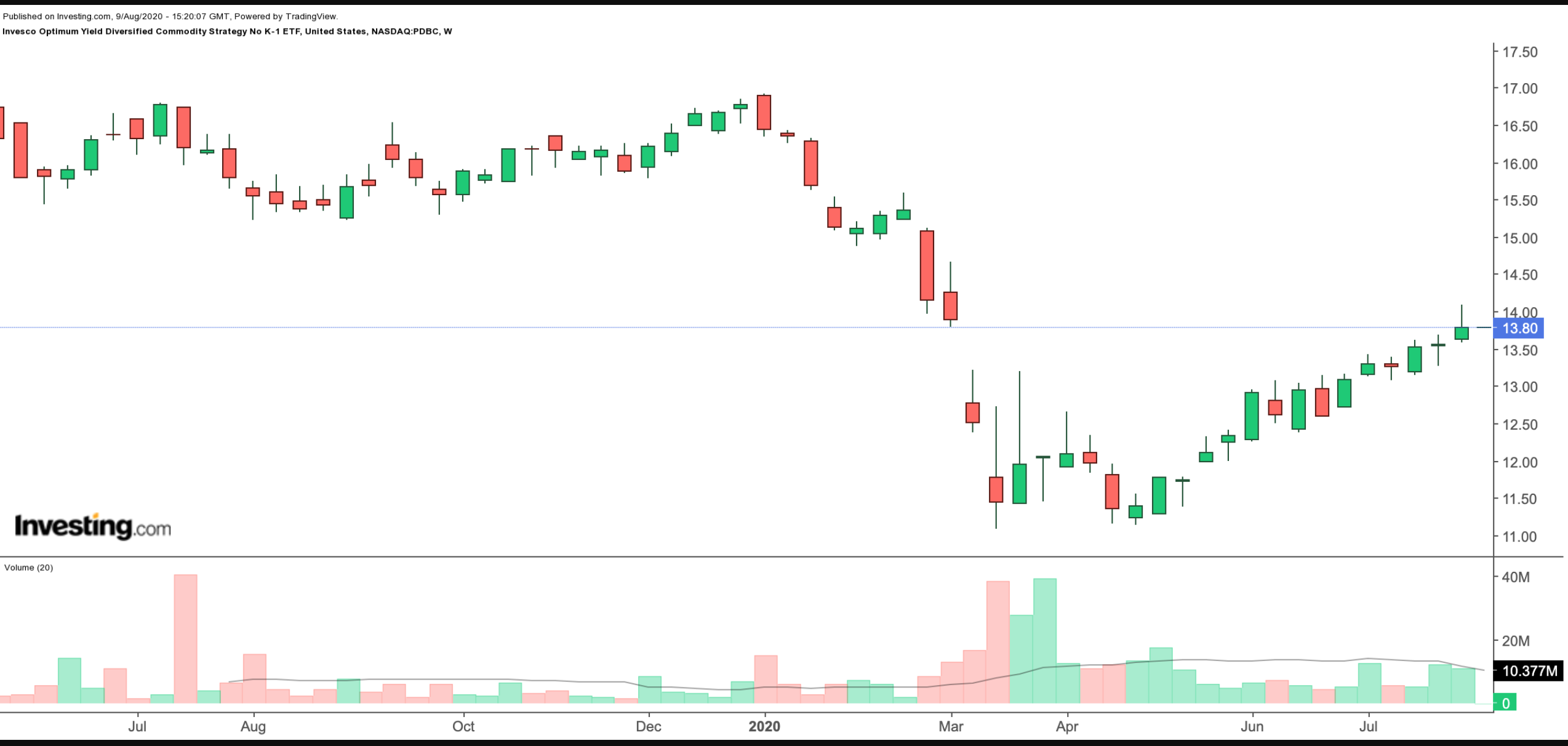U.S. large-cap stocks outperformed most commodities and emerging markets over the last decade. The question now: could this trend start to swing in the opposite direction?
While the SPDR S&P 500 ETF (NYSE:SPY) is up over 210% over the past 10 years, the iShares MSCI Emerging Markets ETF (NYSE:EEM) rose just 7% and the Energy Select Sector SPDR Fund (NYSE:XLE) dropped 25% for the same time period.
ETFs that track gold and silver also saw gains over the past 10 years, although less dramatic than SPY. SPDR Gold Shares (NYSE:GLD) climbed 55% while iShares Silver Trust (NYSE:SLV) increased by 38%. Over long periods, prices of the two metals typically move in tandem. But since silver has been trailing gold in recent years, many analysts forecast that the white metal may have more room to rise in the coming months to make up for the difference.
Here we'll take a closer look at key principals of investing in commodities futures through ETFs as well as a commodities ETF to consider:
'Rolling-Over': What It Means, Why It Matters
Most commodity exchange-traded funds own futures contracts—contracts for future delivery, but not the physical commodity itself.
However, investors should note that future contracts expire every month, so stocks trade in perpetuity. Yet, futures contracts have expiration dates. So to avoid physical delivery at contract expiry, these funds replace expiring contracts with new contracts that end later, a process known as “rolling-over."
Two other key terms to note are "contango” and “backwardation.”
When a market is in contango, the forward price of a futures contract is higher than the current spot price. Contango causes commodity ETFs based on a futures contract to incur a roll-over loss.
On the other hand, when a market is in backwardation, the forward price of the futures contract is lower than the spot price. In that case, there would not be a roll-over loss, but rather a roll-over gain.
Rolling-over into new contracts can be done in a range of ways involving different combinations of futures contracts that a fund can choose from. Rolling-over costs change daily.
Due to this cost structure, returns of such commodity funds can differ from physical commodity prices. Negative roll yields typically decrease returns over time.
1. Invesco Optimum Yield Diversified Commodity Strategy No K-1 ETF
- Current Price: $13.80
- 52-week range: $11.08-$16.91
- Dividend Yield: 1.68%
- Expense Ratio: 0.61% per year, or $61 on a $10,000 investment.
The Invesco Optimum Yield Diversified Commodity Strategy No K-1 ETF (NASDAQ:PDBC) invests in commodity-linked futures and other financial instruments that provide access to a diverse group of commodities.
PDBC aims to provide a long-term capital appreciation strategy that surpasses the performance of DBIQ Optimum Yield Diversified Commodity Index Excess Return, an index composed of futures contracts on 14 commodities across the energy, precious metals, industrial metals and agriculture sectors.

Gold, Gasoline, Crude Crude and Brent Crude futures have the highest weightings, comprising close to 45% of the funds. Wheat, Sugar, Soybeans and Corn make up 25.61% of the fund, while Copper, Aluminum and Zinc compose 13.93% of the ETF. Other holdings include NY Harbor ULSD, Natural Gas and Silver.
Year-to-date, the fund is down over 16%.
Commodity price changes mostly depend on supply and demand dynamics. For example, during a cold winter, as the demand for natural gas increases, so do prices. Commodity prices also usually move higher during inflationary periods, as they are widely considered a hedge against inflation.
Historically, there has been a negative correlation between commodities and stocks. Academic research shows that by investing in commodity futures or ETFs based on these contracts, market participants may be able to decrease the volatility of an all-stock portfolio without reducing their expected return. Thus, investors who are interested in diversifying into commodities may consider researching the fund further.
Bottom Line
Diversification is a fundamental principle of long-term portfolio construction. Therefore, holding commodities as part of an asset-allocation strategy may be appropriate.
However, most commodity ETFs differ from traditional ETFs in a significant way: they typically use futures contracts. As a result, over time, these funds' returns may deviate substantially from the change of the spot price of the underlying commodity. Therefore, it is important to fully understand the potential risk/return profiles before investing.
Finally, in the U.S., there is a range of commodity ETF structures. So investors may want to ask their accountants about various tax implications of investing in these ETFs.
